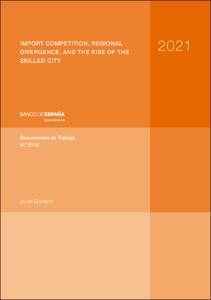Import competition, regional divergence, and the rise of the skilled city
Autor
Fecha de publicación
27-abr-2021
Descripción física
57 p.
Resumen
Este artículo analiza la contribución de la competencia de importaciones a la divergencia regional entre áreas metropolitanas de Estados Unidos. Se acredita que el fuerte aumento de las importaciones de bienes manufactureros de China tuvo un impacto significativo en la polarización geográfica en términos de talento y en la divergencia de la prima salarial de educación entre los mercados de trabajo locales. Los efectos del shock comercial chino fueron significativamente distintos dependiendo de la intensidad en mano de obra cualificada de los sectores de servicios locales. Entre las regiones con servicios intensivos en cualificación, una mayor exposición a las importaciones de manufacturas supuso un aumento tanto del número como de los salarios reales de los trabajadores cualificados. Los efectos negativos del shock se concentraron en las regiones expuestas y con una baja densidad de trabajadores cualificados. La heterogeneidad de los efectos de la competencia de importaciones explica un tercio de la polarización de trabajadores cualificados y un cuarto de la divergencia de la prima salarial. Se muestra que la contribución del shock de comercio internacional opera a través de la recolocación de trabajadores entre sectores y regiones. Usando una nueva medida de «exposición al shock a través del mercado laboral», se documenta que las industrias de servicios se expanden cuando las manufacturas locales se enfrentan a una mayor competencia internacional. Las regiones con alto nivel de capital humano expuestas al shock de importaciones chinas realizan una transición más rápida desde industrias manufactureras hacia servicios de alta cualificación y atraen a trabajadores cualificados de otras regiones.
This paper analyzes the contribution of import competition to the regional divergence among US metropolitan areas over recent decades. I document that the sharp rise in imports of Chinese manufacturing goods had a significant effect on the spatial skill polarization and the divergence of college wage premium among local labor markets. The effects of the China trade shock were systematically different depending on the skill intensity of local services. Among regions with skill-intensive services, a higher exposure to import competition in manufacturing increased the number and wages of college-educated workers. The negative effects of the China shock concentrated in exposed regions with a low density of college-educated workers. The heterogeneous effects of import competition explain one third of the spatial skill polarization and one fourth of the divergence in college wage premium. I show that the contribution of the trade shock operates through the reallocation of workers across sectors and regions. Using a novel measure of “labor market exposure to the China shock”, I document that service industries expand when local manufacturers face import competition. High human capital regions exposed to the China shock undergo a faster transition from manufacturing to skill-intensive service industries and attract college-educated workers from other locations.
This paper analyzes the contribution of import competition to the regional divergence among US metropolitan areas over recent decades. I document that the sharp rise in imports of Chinese manufacturing goods had a significant effect on the spatial skill polarization and the divergence of college wage premium among local labor markets. The effects of the China trade shock were systematically different depending on the skill intensity of local services. Among regions with skill-intensive services, a higher exposure to import competition in manufacturing increased the number and wages of college-educated workers. The negative effects of the China shock concentrated in exposed regions with a low density of college-educated workers. The heterogeneous effects of import competition explain one third of the spatial skill polarization and one fourth of the divergence in college wage premium. I show that the contribution of the trade shock operates through the reallocation of workers across sectors and regions. Using a novel measure of “labor market exposure to the China shock”, I document that service industries expand when local manufacturers face import competition. High human capital regions exposed to the China shock undergo a faster transition from manufacturing to skill-intensive service industries and attract college-educated workers from other locations.
Publicado en
Documentos de Trabajo / Banco de España, 2115
Otras versiones
Materias
Comercio internacional; Competencia de importaciones; Desigualdades regionales; Polarización de talento; Movilidad de factores; International trade; Import competition; Regional inequality; Skill sorting; Factor mobility; Comercio internacional; Economía regional y recursos naturales; Relaciones laborales; Mercado de trabajo; Estados Unidos
Aparece en las colecciones:












